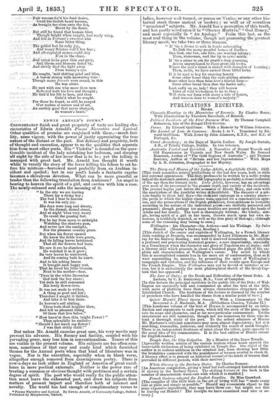EDWIN ARNOLD'S POEMS. * - CONSIDERABLE finish and great propriety of taste
are leading cha- racteristics of Edwin Arnold's Poems Narrative and Lyrical. Other qualities of promise are conjoined with these,—much faci- lity, some vigour, with the power of justly appreciating the true -nature of thedistant or the past. But delicacy and propriety, both -of thought and execution, appear to us the qualities that separate higrarom most-other poets. His Violetta" is founded on the ques- tionable incident of the lady mistaking her bedroom, and sleeping all night-by the side of her lover that is to be ; yet the telling is managed with great tact. Mr. Arnold has thought it worth
while to versify the story of the lover killing his falcon to set be- . .
fore his mistress—borrowed most probably from an Arabian in- oident and spoiled ; but in our poet's hands a fantastic caprice becomes a chivalrous devotion. 'What can be more graceful or -tender than the following translation from Andersen ? An angel is bearing to heaven the spirit of a girl, and carries with him a rose. The newly-released soul asks the meaning of it.
"In the city we are leaving
- There lay a dying boy ;
ieuliiiw - The bud I bear to heaven
It was his only joy.
Rio days were long and dreary, . In. the dismal, dismal street, And at night 'twas very weary To count the passing feet. For he lay from morn to midnight Watching the shadows pass, And never saw the sunlight, Nor the pleasant country grass. But when his flower opened He knew the fields were green, And its falling leaves betokened. That all the flowers had been. He saw it ere he slumbered, He watched it as-it grew; Its very leaves he numbered, And ita coming buds he knew. And to his aching bosom It brought such happy rest, That he loved his little blossom Next to his mother—best. 'Twas iii the 'white December God took the boy above; Yet (loth he still remember His lowly flower-love.
' It was not made to wither, A thing so good and fair; Therefore I sought it thither, And take it to him there.
In heaven's soil abiding, These buds shall brighter blow, And-tell us pleasant tiding Of those that live below."
"Bow know'st thou this bright Power l" Then splendidly he Liled-
" Should I not know my flower ?
/ was.that sickly child!"
But unless Mr. Arnold exercise great care, his very merits may prevent his advance. His fluency and facility, coupled with his pervading grace, may lose him in conventionalism. Traces of this are visible in the present volume. His subjects are too often com- mon, sometimes of that easy and ready kind which furnished themes for the Annual poets when that kind of literature was in vogue. Nor is the execution, especially when in blank verse, altogether enough removed from d.rawingroom poetry. There is now-a-days no lack:either in England or America of great excel- lence in mere poetical externals. Neither is the power rare of treating a common or obvious thought with prettiness and a certain degree of spirit. The poet who would really fix the public atten- tion must leave the exhausted past, and draw his subjects from matters of present "import and therefore both of interest and novelty. The world has had enough of complimentary verses to
• Poems Narrative and Lyrical. By Edwin Arnold, of University College, Oxford. Published by Macpherson, Oxford.
ladies, however well turned, or pciems. on Venice; Or any- other his- torical stock theme ancient or modern ; as "well as of' countless "occasional" sabWets. Mr. ArnOralaS a perception of this truth, and has partly acted upon it in " ObSetre Martyrs," "God Money.," and • more especially in " An Apolegy.'s From this last, as the most real thing in the volume, though nbt possessing the greatest literary merit, we take two or three staiizai, " If a dream to seek in bonds unbreaking To link the many-peopled homes of Earth— One -God, one law, one love, one worship taking ; Then, 'statesman, -writhe lip in cynic mirth.
If 'tisc crime-to ask for youth's- deep yearning, Access unpnrehased to those -great old. books, Where the soul's thirst:is slaked with firaughts of learning ;
Then, noble, we have earned those bitter looks.
If it be mad to beg for starving beauty -
Some other home' than the rude glaring streets— Some other-love than false love's fearful' duty—
Some other bread than that the harlot eats; Look sadly on us, lady ! they will borrow Tales of wild wickedness to lie to thee ; Will stain our fame with many a tale of horror,
And treason done to woman's majesty."'


























 Previous page
Previous page